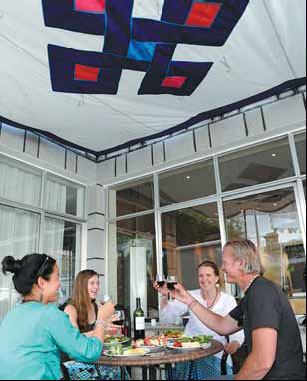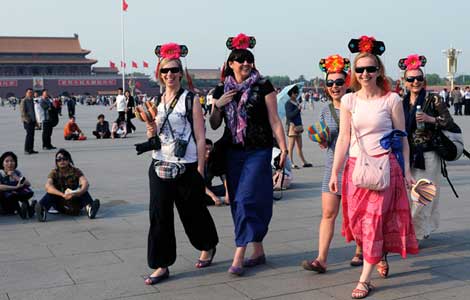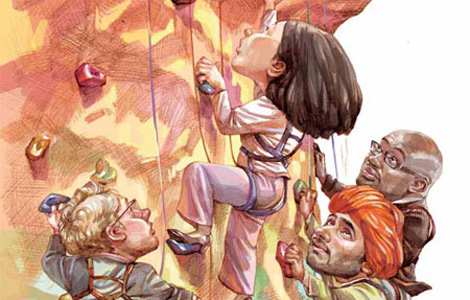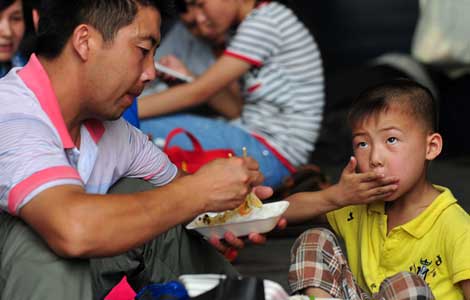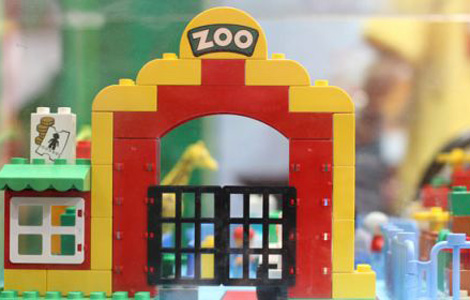Strong family values at the cafe on the roof of the world
Updated: 2013-07-31 07:39
By Tang Yue (China Daily)
|
||||||||
|
Douglas E. Wilford with his wife Brenda (second right), daughter Bethany and a friend at their home in Lhasa. |
Like many foreigners, Douglas E. Wilford originally saw Tibet as a great tourist destination. However, unlike the average tourist, he didn't simply go home and mull over photos. He quickly returned to the "roof of the world" and has now lived in the Tibet autonomous region for the best part of nine years.
For Wilford, "growing up reading National Geographic, full of cool stories about Mount Everest (called Qomolangma in China) and climbing expeditions, exotic places", Tibet has always been a land of dreams.
The 49-year-old Ohio native made his first trip to Tibet in 1998 and returned a year later to study the Tibetan language at the Tibet University in Lhasa.
In 2005, after four years in Beijing, he relocated to Lhasa with his wife and four children - including an adopted Chinese daughter - and opened the Summit Cafe, close to the bustling thoroughfare called Barkhor Street.
"I saw that the government was building the railway and promoting Lhasa as a major tourist destination," recalled Wilford. "Of course, I love the mountains, the clean air and the open spaces. There's a growing market, a developing tourism sector, and business opportunities."
Back in 2005, the flocks of tourists who visited Lhasa had to make do with instant powdered coffee instead of the real thing. The lack of a decent cup of coffee was the spark that led Wilford to open the first Summit Cafe.
"We just wanted to provide a product in a service industry that people really wanted. We wanted to create a non-Asian feel in a very Asian place. The foreign tourists just needed a place to relax, talk, send a postcard," he said.
The cafe was an immediate success, so Wilford quickly opened a second branch in a non-tourist zone and targeted the local market.
"The tourist model is that business goes down for five months during the winter. We wanted to create a new model that was local-based. Now, people don't only go to traditional tea houses, they also go and grab an espresso," he said.
He's pleased to have had a wider impact on the local community by employing Tibetan women, most of whom were illiterate before they started working at the cafe.
Tse-nga, 33, has worked at the Summit since it opened, first as a waitress and now as a cashier.
"Making coffee is more difficult than making tea. I was very nervous at first, but the boss never criticized us. He's always easygoing and nice," said the native of the Chamdo area in eastern Tibet.
"I studied English for one and a half years at the Tibetan Academy of Social Sciences. Douglas paid the fee. Some former waitresses have become tourist guides, but he never complained," said a smiling Tse-nga, who has no difficulty speaking English to the foreign customers.
The cafe acts as a hub where East meets West, and it's where Chen Jie from Hebei province met her husband, who's from the US.
"It's an amazing place where people get to know each other and the waitresses are always very friendly. You can tell their happiness comes from the bottom of their hearts," said Chen, who owns a jewelry and handicrafts store in Lhasa.
Chen, a close friend of the Wilford family, respects Douglas' investment in his family. "No matter how busy he is, he always spends a lot of time with the children and he makes furniture for the house with his own hands instead of spending a lot of money," she said.
Wilford loves to take the credit for that. He lives in a two-story building with his wife, Brenda, and their three daughters and son close to a park in eastern Lhasa.
He goes home at 6 pm every day. Brenda cooks and the family gathers for dinner. "We have strong family values," he said. "As China becomes wealthier and struggles with materialism, you can really get sidetracked. I think quality of life is in relationships, in the family. I don't need millions of dollars in the bank, I just need to provide good food for my family and I need a decent house.
"We traveled to Africa last summer and have also met some Tibetan nomads. I told the kids these people have nothing. They probably don't have bank accounts, but they are happy and satisfied. That's a precious lesson for the kids."
The children are home-schooled and making friends can be difficult because the foreign community is small and the children have to spend a lot of time studying.
But Wilford believes the advantages of growing up in Tibet outweigh the drawbacks.
"The peer pressure in America is something I feel good about protecting them (the children) from. It can be very material, very superficial and when they get older, they focus on boy-girl relationships and they can go astray if they don't have a good moral foundation," he said.
"I think they are better prepared for life and adulthood by growing up in this environment, very close to nature."
Wilford's oldest daughter, Bethany, 17, will start college in California in the autumn, so the family will be based there for a year.
"I've only lived in America for a year. So I'm excited to go back and learn about my home country and culture. I know a lot of about other people's cultures, but I don't know much about my own," she said.
"I will definitely miss Tibet. I will miss the mountains; the sky is so blue and the weather is gorgeous here. The culture is unique and lovely. I grew up here. This is my home. I will try to come back during school vacations."
Contact the writer at tangyue@chinadaily.com.cn
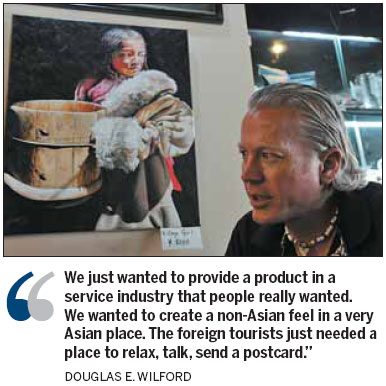
(China Daily USA 07/31/2013 page7)
Most Viewed
Editor's Picks

|

|

|

|

|

|
Today's Top News
China-US talks yield 'incremental progress'
Spain investigators: Train driver was on phone
Apple faces more staff abuse charges
Spending surge for renewables
Beijing and Canberra to resume trade talks
Top leader vows to meet growth target
2,290 disciplined for extravagance
Japan diplomat seeks to mend ties
US Weekly

|

|
